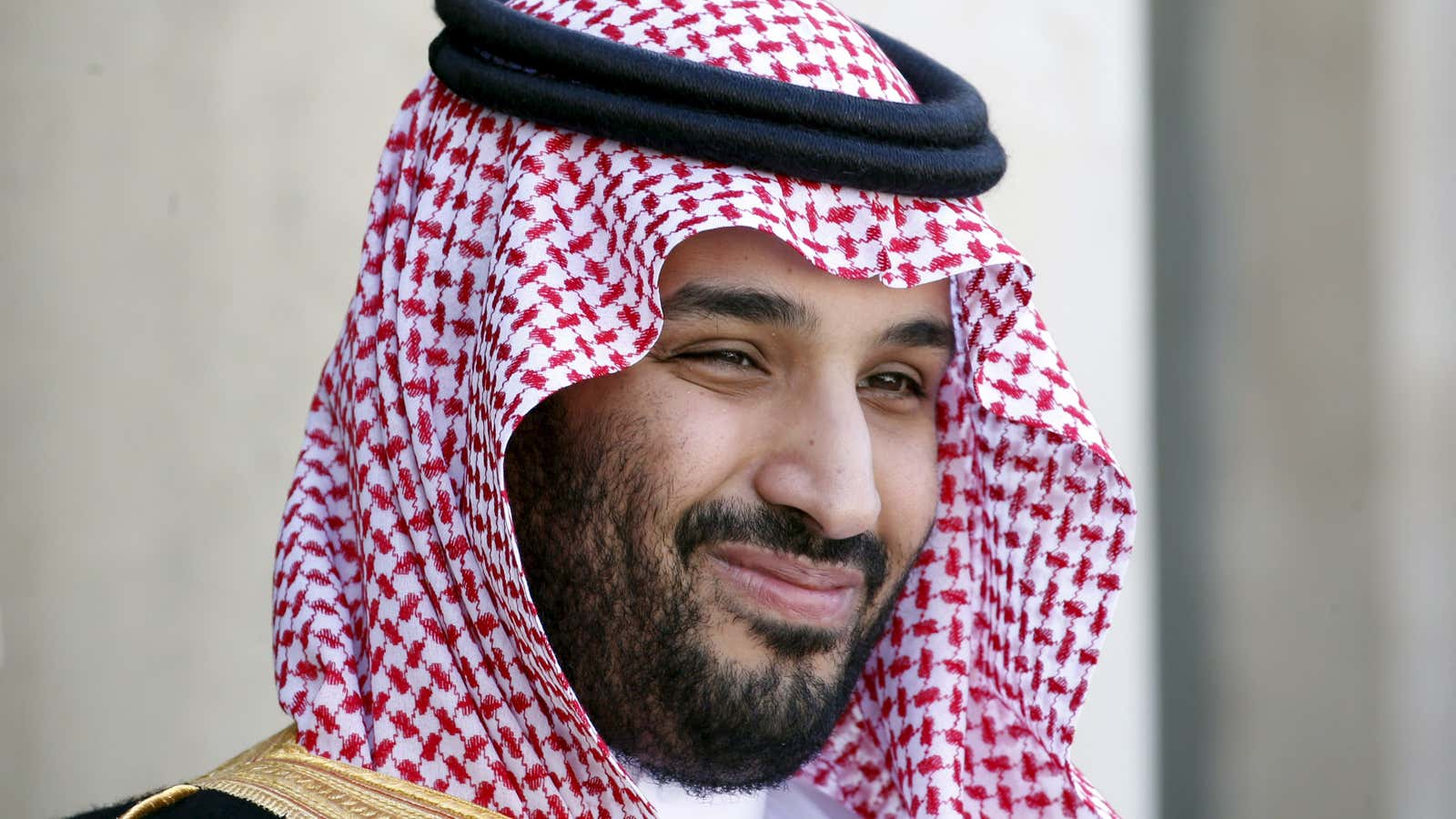Saudi deputy crown prince Mohammed bin Salman today announced an ultra-ambitious economic and social makeover that he said would allow the kingdom to survive without oil in just four years. He also said the reclusive kingdom would open up more broadly to tourism.
In a sweeping announcement delivered in a television interview, prince Mohammed painted a future in which the kingdom—for seven decades the single-most influential oil power in the world—would no longer rely on petroleum. Instead, he said, Saudi Arabia will become a financial center and an investment powerhouse.
At the core of this momentous shift, 5% of Saudi Aramco—the nation’s financial milking cow, and the single richest oil company in the world—would be sold off in an IPO. Shockingly, if you happen to be an international investor, ultra-secretive Aramco’s financial books will be entirely opened, he said.
“I think by 2020, if oil stops we can survive. We need it, we need it, but I think in 2020 we can live without oil,” he said.
Prince Mohammed said the moves would begin next year, but otherwise was light on details in terms of what industries Saudi Arabia would pivot to. While outsiders are likely to look brightly at the chance of owning part of Aramco, and an easier, more open society, it will be difficult to execute the plan. Among the obstacles: Saudi Arabia’s powerful and conservative clergy, and the fact that the prince is talking about marginalizing the large bulk of the kingdom’s hard wealth—oil.
Popularly known as “MbS,” prince Mohammed, who is the son of king Salman, has built up to the announcement in a months-long charm offensive, in which he asserted that things are changing in a kingdom known in the West as oil-soaked, doctrinaire, and degrading of women.
In ads, a new Twitter account, and remarkable, long interviews with the Economist and Bloomberg Businessweek magazines, the 31-year-old prince described a country that was in an economic tailspin because of low oil prices, but is now in a new, more open age. Under his father, the government is restraining religious police and, prince Mohammed said, possibly conferring more rights on women.
All of this culminated today with the release of “Saudi Vision 2030,” a long-term plan that was rubber-stamped by the government this morning (April 25). It is to be followed up with a five-year “National Transformation Plan,” to be released in the coming weeks.
Don’t look for big new industries in Saudi Arabia itself
The indication is that any economic shift won’t mainly involve new domestic industries, but simply the diversified investment of some $2 trillion in Saudi oil earnings abroad.
Prince Mohammed is unlikely to aim for a radical, fast redirection of the gigantic Saudi ship, but rather will unfold his steps over the next half century, Paul Sankey, an analyst with Wolfe Research, said in an April 20 note to clients.
The main message that has emanated from Riyadh over the last week or two is that, while the prince is not actually king, his father gives him much latitude to be more or less the kingdom’s CEO. If anyone had any doubts, the message was clearly telegraphed on April 17, as oil producers were meeting in Doha with expectations of a freeze on global petroleum output in order to push prices higher. According to the Financial Times, prince Mohammed killed the deal, phoning the Saudi delegation at 3am and summarily ordering them home.
It was a brash move, considering that the delegation was as usual headed by Ali Naimi, who at the age of 80 is a highly respected oilman who has skillfully run Saudi oil policy since prince Mohammed was in elementary school. In the end, someone talked prince Mohammed down off the ledge, and the delegation stayed, but with a very different strategy from what had been carefully planned. Now, they were to oppose any freeze.
With briefs covering the military, the economy, and oil, the prince is—short of his father—easily the most powerful official in Saudi Arabia. When foreigners refer to him in emails and investment notes, they call him MbS, a familiarity not used for prior powerful royals.
But, after Doha, and today’s announcement, no one is mistaking that amiability for weakness.
